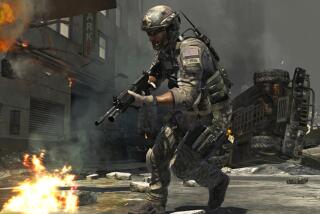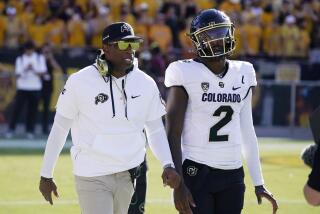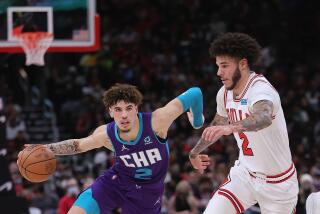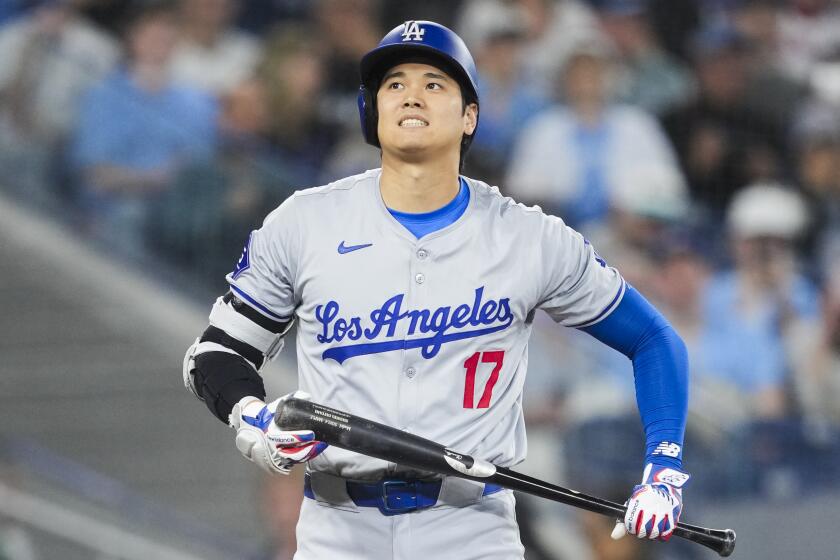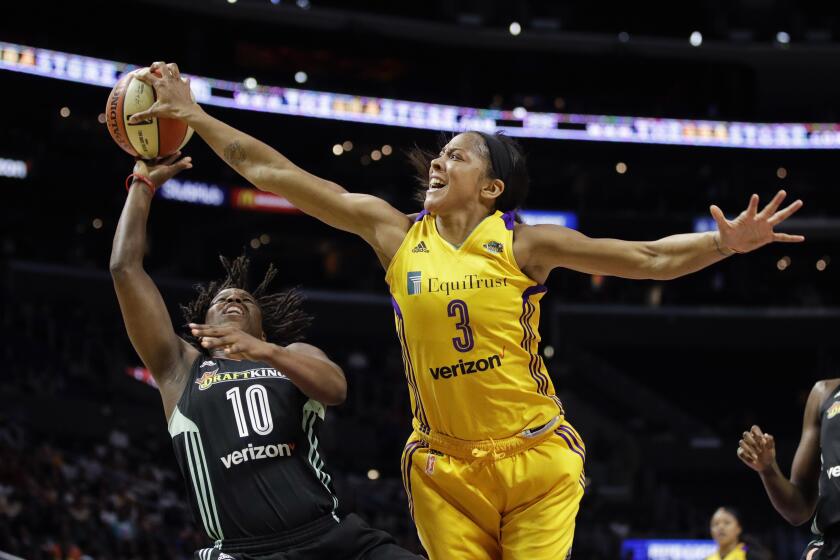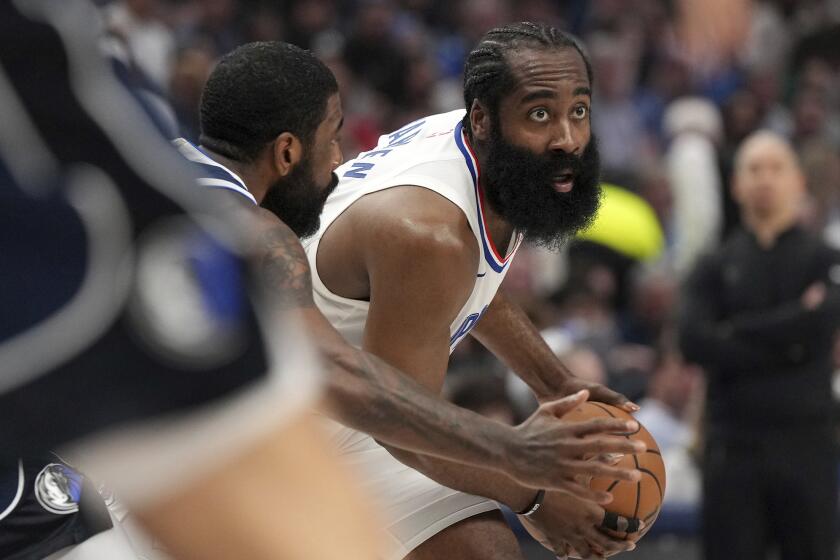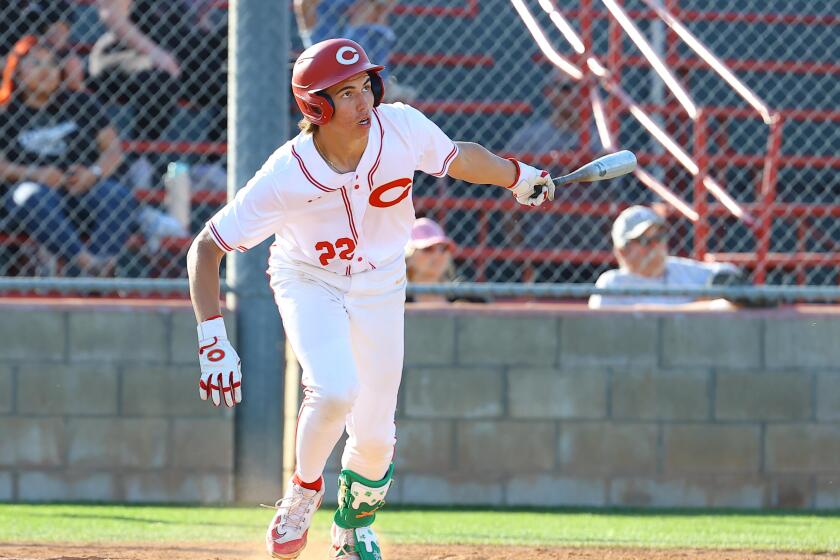Players file antitrust lawsuits against NBA
The first sign of inclement weather in the so-called nuclear winter arrived Tuesday when Carmelo Anthony, Kevin Durant and a handful of other players sued the NBA with antitrust lawsuits at federal courts in Oakland and Minneapolis.
Perennial All-Stars Anthony and Durant said the NBA violated antitrust laws and conspired to “boycott players” by attempting to force them to take massive reductions in compensation. The 30 NBA teams were named as defendants in the class-action suit filed in Oakland on behalf of the NBA’s 439 players.
A similar lawsuit was filed Tuesday in Minneapolis by free-agent forward Caron Butler and Minnesota forward Derrick Williams, the second overall selection in the NBA draft who has yet to sign a contract because of the 139-day lockout.
The litigation was expected after players filed a disclaimer of interest Monday, effectively dissolving their union. It also mirrored the actions of NFL players who decertified their union in March and filed an anti-trust suit against the league on behalf of Tom Brady, Peyton Manning and Drew Brees.
The moves by the NFL players’ union were contributing factors to owners and players ending their labor dispute in time for the football season to start on time.
But on Tuesday, the NBA canceled games through Dec. 15, wiping out what would have been the first six weeks of the season. The league still hasn’t canceled its treasured Dec. 25 slate of games, though it doesn’t look promising.
Legal experts said there was no guarantee of the players’ disclaimer, or ensuing lawsuits, making an immediate impact.
“The big catch there is courts move very slowly,” said Paul D. Staudohar, an emeritus professor of business at Cal State East Bay and longtime contributor to the “Labor Law Journal” and “Monthly Labor Review.” He added, “It can take months, even years, before a final decision is made.”
Players are hoping to bend the alleged strong-arm tactics of NBA owners by appealing to California courts that are comparatively liberal, Staudohar said, adding that players’ lawyers perceive the courts to be “more employee-oriented.”
It’s in “everybody’s interests to resolve this quickly,” said David Boies, an attorney for the players, at a news conference.
In the best-case scenario, the players’ actions would bring the owners scrambling back to the negotiating table even though NBA Commissioner David Stern said there was no chance of that.
“The situation has sort of been broken into small pieces,” said Gabe Feldman, a law professor and director of the Sports Law Program at Tulane University. “They can be put in time to save the season, but it takes some time to reform.”
Despite Stern’s assertion that the season was in jeopardy and that a “nuclear winter” had descended upon the league, the NBA anticipated the players’ union would dissolve and filed a preemptive lawsuit of its own earlier this month that the union was not bargaining in good faith.
Stern also released a statement Monday that players’ attorney Jeffrey Kessler had threatened the NBA with an antitrust suit as far back as February 2010, setting the stage for a possible NBA courtroom strategy.
“We’ve done everything anybody could reasonably expect of us,” said Billy Hunter, head of the disclaimed players’ union. “The players just felt they had given enough.”
Players’ unions have felt that way historically a few times in the NFL and NBA, with varying degrees of success.
After the NFL players’ union decertified in March, a district judge ruled a month later that the owners’ lockout should be lifted. But in July, the U.S. 8th Circuit Court of Appeals overturned that decision, saying the antitrust lawsuit brought by the players was a labor issue and not an antitrust case. Less than two weeks later, the parties came to an agreement.
In 1995, NBA owners installed a lockout and players took steps toward decertification by petitioning the National Labor Relations Board. The brief disagreement ended when owners withdrew certain restrictions against free agency and the union voted resolutely against decertification. The 1995-96 season started on time.
In 1998, the NBA union again faced another lockout, but the players and owners eventually reached an 11th-hour agreement in January 1999 and a 50-game season began Feb. 5.
twitter.com/Mike_Bresnahan
More to Read
Get our high school sports newsletter
Prep Rally is devoted to the SoCal high school sports experience, bringing you scores, stories and a behind-the-scenes look at what makes prep sports so popular.
You may occasionally receive promotional content from the Los Angeles Times.
